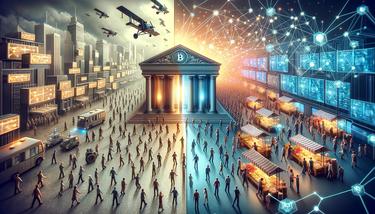DAO
Decentralized Autonomous Organizations (DAOs) are a form of organization represented by rules encoded as a computer program that is transparent, controlled by organization members and not influenced by a central government. DAOs are the most effective way of establishing a digital company and are efficient for managing a common fund without traditional management structures.
How DAOs Work
DAOs operate on blockchain[1] technology, leveraging smart contracts[2] to automate decision-making and operations. Members of a DAO typically hold tokens that represent voting power. The more tokens a member holds, the greater their ability to influence decisions within the organization. Decisions in a DAO are made via proposals that are voted on by all token[3] holders.
Applications of DAOs
DAOs have a wide range of applications, including venture capital funds, charitable organizations, and decentralized freelance networks. They offer a transparent, efficient, and secure way of making collective decisions without centralized authority.
Benefits and Challenges
The benefits of DAOs include increased transparency[4], elimination of intermediaries, and enhanced democratization of decision-making. However, they also face challenges such as legal recognition[5], security vulnerabilities, and the potential for a lack of accountability among members.
DAOs represent a groundbreaking shift in the concept of organizational governance, offering a glimpse into the future of decentralized digital organizations. As technology and legal frameworks evolve, DAOs may become a standard for collaborative efforts and organizational structure in the digital age.
Key Facts
- DAOs are based on blockchain technology and utilize smart contracts for automation.
- They are governed by their members, with decisions made through a democratic voting process.
- DAOs can serve a variety of purposes, from venture capital to charitable endeavors.
DAO
Decentralized Autonomous Organizations (DAOs) represent a novel paradigm in the organization and governance of collective efforts, leveraging blockchain technology to facilitate decentralized decision-making and resource management. DAOs operate on principles of transparency, democracy, and autonomy, bypassing traditional hierarchical structures to create a more equitable and efficient model for collaboration and value distribution.
Introduction to DAOs
DAOs are blockchain-based entities that are governed by smart contracts, which are self-executing contracts with the terms of the agreement directly written into code. These organizations are owned and managed by their members, with decisions made through consensus mechanisms[6] or voting systems encoded into the blockchain. This setup ensures that control is distributed among members rather than centralized in a single authority, reflecting a true democracy in organizational management.
How DAOs Work
At the heart of a DAO is its foundational smart contract, which defines the rules of the organization and holds its assets. Members of a DAO interact with these rules through tokens that grant voting rights, typically proportional to the number of tokens held. This democratic process allows for transparent and verifiable decision-making on matters such as resource allocation, policy changes, and project development.
Advantages of DAOs
DAOs offer several advantages over traditional organizational structures. These include enhanced transparency, as all transactions and decisions are recorded on the blockchain; increased security, given the tamper-resistant nature of blockchain technology; and improved efficiency in decision-making, as the need for intermediaries is eliminated. Additionally, DAOs facilitate global collaboration, allowing individuals from anywhere in the world to join forces and resources towards common goals.
Challenges and Considerations
Despite their potential, DAOs face challenges related to legal recognition, regulatory compliance[7], and security vulnerabilities. The decentralized nature of DAOs poses questions about liability and jurisdiction, complicating their interaction with traditional legal frameworks. Moreover, the reliance on code for governance introduces risks of bugs or exploits, which could lead to loss of funds or unintended organizational actions.
Examples and Applications
DAOs have been applied in various domains, from venture capital and crowdfunding[8] to governance and community projects. Examples include investment DAOs pooling funds to invest in startups, social DAOs focusing on philanthropy, and creator DAOs supporting artists and content creators. These applications demonstrate the versatility of DAOs in organizing collective action and resources towards diverse objectives.
The Future of DAOs
The future of DAOs is promising, with ongoing innovations aimed at enhancing their scalability[9], security, and legal frameworks. As more people become familiar with blockchain technology and its potential for decentralized governance, the adoption of DAOs is likely to grow. This could lead to a significant shift in how organizations operate, promoting a more democratic, efficient, and transparent model of collaboration.
In conclusion, DAOs offer a transformative approach to organization and governance, challenging traditional centralized models and paving the way for a future where collective efforts are managed through the principles of democracy, transparency, and decentralization[10]. As the technology matures and legal frameworks evolve, DAOs could become a standard for collaborative endeavors across various sectors.
- Blockchain — A decentralized digital ledger recording cryptocurrency transactions across multiple computers.
- Smart Contracts — Self-executing contracts with terms directly written into code, facilitating, verifying, or enforcing a contract on the blockchain.
- Token — A unit of value issued by a project, representing various assets or utilities on a blockchain.
- Transparency — The characteristic of blockchain technology that allows all transactions to be visible and verifiable by all network participants.
- Legal Recognition — The process by which a legal system acknowledges the existence and validity of something as part of its regulatory framework.
- Consensus Mechanisms — Processes used in blockchain networks to achieve necessary agreement on a single data value or a single state of the network among distributed processes or multi-agent systems, such as Proof of Work or Proof of Stake, ensuring all transactions are valid and preventing fraud.
- Regulatory Compliance — Adherence to laws, regulations, guidelines, and specifications relevant to business processes.
- Crowdfunding — The practice of funding a project or venture by raising small amounts of money from a large number of people, typically via the Internet.
- Scalability — The ability of a blockchain network to handle a large number of transactions quickly.
- Decentralization — Distribution of power away from a central authority in the management of cryptocurrencies.


